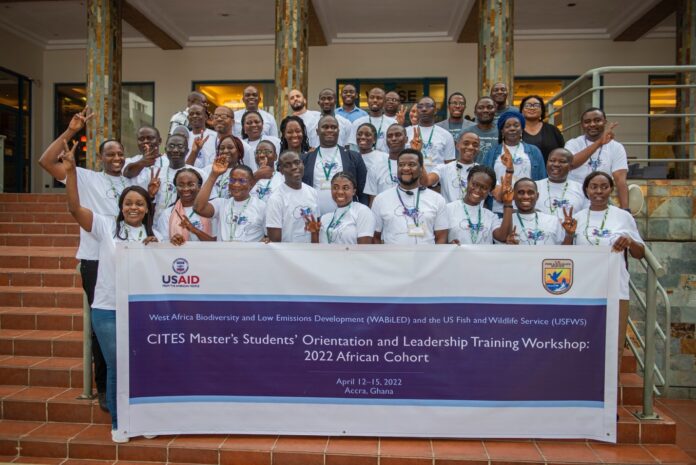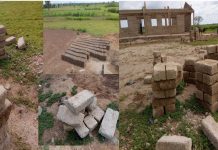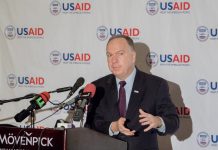
More than 30 students from the African continent are preparing to embark on a prestigious advanced degree program aimed at combating a growing threat, wildlife trafficking.
The West Africa Biodiversity and Low Emissions Development (WABiLED) Program, a four-year program funded by the United States Agency for International Development (USAID), partnered with the U.S. Fish and Wildlife Service (USFWS) International Affairs Program and the International Technical Assistance Program of the U.S. Department of the Interior.
The collaboration supports 31 students from West, Central, and East Africa to obtain a Convention of International Trade in Endangered Species of Wild Fauna and Flora (CITES) Master’s degree at the University of Andalucía in Spain.
For West Africa, WABiLED is working with the Economic Community of West African States (ECOWAS) Commission and its Member States to directly sponsor a cohort of 15 specialists from CITES Management, Scientific, and Enforcement Authorities in Benin, Burkina Faso, Côte d’Ivoire, The Gambia, Ghana, Guinea, Guinea Bissau, Liberia, Mali, Niger, Nigeria, Senegal, Sierra Leone, and Togo.
Before travelling to Spain, the program provided a pre-departure orientation workshop for all students in Accra from April 11th to April 15th, 2022. The workshop focused on three pillars: leadership, team building, and professional and academic growth.
Stephen Kelleher, Chief of Party of the WABiLED program said “USAID, through the WABiLED program and in collaboration with ECOWAS, remains committed to supporting the West African region to protect its abundant wildlife species. We are excited to see the results of this key partnership. This marks the third cohort sponsored by USAID for this globally unique course.
Through the prior two cohorts, wildlife professionals enhanced their understanding of the wildlife trade and grew into roles of leadership, impacting their respective countries and the region at large. This is another crucial step in building expert capacity to improve wildlife law enforcement and coordination in West Africa.”
The demand for illegally traded wild fauna and flora is increasing as confirmed by the various Biodiversity Threats Assessments conducted under the WABiLED predecessor program, the West Africa Biodiversity and Climate Change Program (WA BiCC).
The assessments identify that wildlife crime and trafficking are on the rise in West Africa, resulting in the devastation of biological diversity across the region and beyond.
In accordance with the ECOWAS Environmental Policy, there is an urgent need to augment efforts to address the growing challenge posed by wildlife trafficking and related crimes, which have been known to include illegal arms, narcotics, and minerals among other contraband. This dynamic requires the involvement of stakeholders at all levels.
The African Union’s Strategy on Combating Illegal Exploitation and Illegal Trade in Wild Fauna and Flora and ECOWAS’s pending West Africa Strategy to Combat Wildlife Crime provide platforms for collaboration between the U.S.
Government and the ECOWAS Commission to strengthen capacity in the West Africa region to more effectively implement CITES. “Given the magnitude of wildlife trafficking, CITES is a key conservation tool for wild plant and animal species,” Anna Seidman, Assistant Director, USFWS International Affairs said.
“We are cognizant that while CITES must be fully implemented in all countries to be truly effective, not all countries have the resources readily available to them to do so. We are excited to support the CITES Master’s Course and welcome this new cohort of future CITES leaders and look forward to working together to address the complex social and economic drivers of wildlife trafficking in Africa and around the world.”
Bridgette Abeka-Mensah, the Ghanaian participant chosen for this masters’ degree added: “I am excited about meeting with a diverse group of people from all over Africa at this workshop, and more people beyond the borders of Africa while in Spain. I am looking forward to networking, learning, and coordinating with interesting people during my stay in Spain and after the master’s program.”
“Seeing wildlife enforcement roles being usually perceived as a man’s job, I am happy that this sponsorship program is supporting women like myself to break the glass ceiling.”
The U.S. Embassy Accra’s Acting Deputy Chief of Mission, Stephanie Hutchinson, delivered opening remarks that motivated participants to share their experiences with others to help eradicate wildlife crime. Also in attendance was Mokpidie Damas, Forest Governance and Environmental Expert from the Central Africa Commissions (COMIFAC), Victor Mombu, USAID/West Africa Environmental Policy Officer, Chris Schaan, USAID/West Africa’s Environment Team Lead, Yula Kapetanakos, from the US Fish and Wildlife Service, and Kossivi Amegan, from the US Department of the Interior.
The CITES master’s students departed for Madrid on April 15th, where they will reside for the coming three months until returning to their respective home countries to complete their programs.
About the West Africa Biodiversity and Low Emissions Development project (WABiLED):
WABiLED is a USAID-funded program, implemented by Tetra Tech ARD, focused on combating wildlife trafficking and supporting great ape conservation, reducing deforestation and biodiversity loss in key forests, and reducing greenhouse gas emissions through improved forestry and land use.




